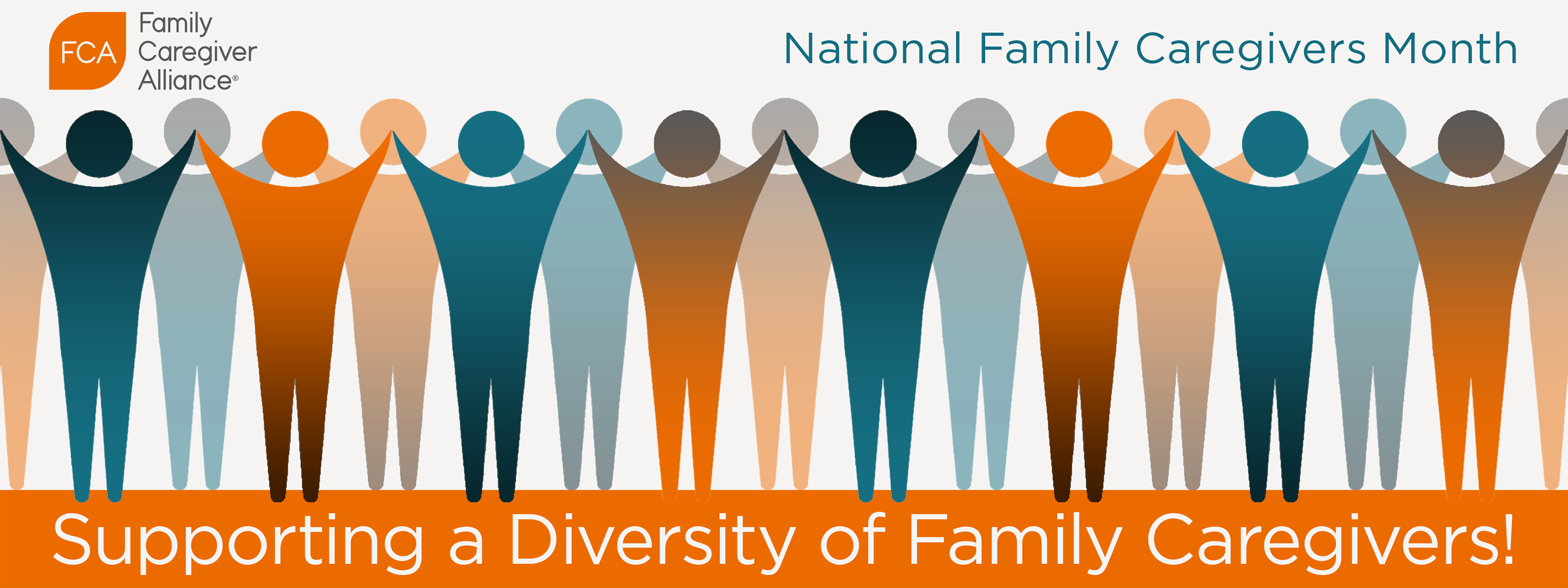Supporting a Diversity of Family Caregivers
Family Caregiver Alliance’s 2022 theme for National Family Caregivers Month, “Supporting a Diversity of Family Caregivers!,” recognizes the many communities and cultures to which family caregivers belong.

Caregivers come from a range of communities, backgrounds, ethnicities and identities. While their life experiences may vary greatly, what they have in common is the care and assistance they provide to family members or friends in need of support.
This month, for National Family Caregivers Month, Family Caregiver Alliance is celebrating the diversity of the 53 million Americans who have stepped into the role of family caregiver. As an advocate and direct services provider for family caregivers for more than 40 years, we know that the diversity of caregiver identities and experiences means that caregivers face a wide-ranging diversity of caregiving challenges, situations and needs.

Resources for different folks, different communities
In serving family caregivers in the culturally diverse San Francisco Bay Area, FCA has been honored to support caregivers from all backgrounds and communities. We have and continue to serve caregivers who are young, or come from different ethnic backgrounds or cultures, or belong to the LGBTQ+ community. Over time, we have developed resources and assistance specific to their differing needs, including:
- Translated materials (fact sheets, articles, videos and more)
- Tailored support groups
- Classes and events in a range of languages and specific to LGBTQ+ caregivers
- Family Consultants and Resources Specialists who are bi- or multi-lingual and can assist caregivers directly in Spanish, Mandarin, Cantonese, Tagalog and Korean
- Partnerships and programs elevating support for LGBTQ+ caregivers
Even more resources for 2022
This month, we’re excited to share all-new customized resources as well as brand new sections of our website for family caregivers who speak primary languages other than English. Please take some time in exploring the following resources—and share with family caregivers in your life!
- For caregivers
- New sections of our website for family caregivers who speak Spanish, Chinese, Tagalog and Vietnamese. From these new pages, caregivers can search for and find upcoming classes in their preferred language as well as translated materials within our extensive resource library.
- Newly translated fact sheets on a range of caregiving topics, in English, Spanish, Chinese, Tagalog and Vietnamese.
- “Top Resources” — These most popular resources among caregivers are available in English, Spanish, Chinese, Tagalog and Vietnamese.
- ¿Que Pasa? Boletin — Our new Spanish language e-newsletter for caregivers (Connections is our English-language e-newsletter).
- Support groups and online communities for LGBTQ+ caregivers, Spanish-speakers and young caregivers.
- Resources for LGBTQ+ caregivers
- For providers — If you’re a health care, social service or other provider who serves family caregivers, check out the resources above and bookmark them to share with your clients or patients. Also be sure to download our:
- Caregiver screening toolkit — Contains two simple questions to help you identify family caregivers and connect them with resources.
- Family caregiver self-screening sheet — A handy resource for your waiting room or client info-packet that helps your patients or clients self-identify as a family caregiver and take next steps for assistance.
As recognition of caregivers grows, so do opportunities to help
We know more than ever about family caregivers’ struggles, challenges and well-being. This is due in part to a shift in our larger culture that’s giving voice and visibility to caregivers, and the focused efforts by institutions and other organizations to shed light on the caregiver experience.
FCA’s own CareNav platform—and groundbreaking expansion project across California—is illuminating valuable data that paints a fuller picture of caregivers’ needs. This recent initiative is already helping us and our partners improve service recommendations and delivery, identify and mitigate risk for caregivers, and better support them—especially those in vulnerable groups.
This is an exciting time to serve caregivers from all communities and cultures. We hope you’ll join us in celebrating and supporting them!
